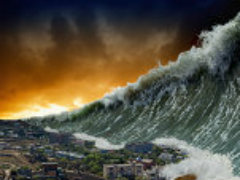New Delhi, Oct 1: Looking for data on past tsunamis for a better understanding of the natural phenomenon, a team of researchers has come upon evidence which suggests that the Indian coast was hit by a sea surge some 1,000 years back, before the tsunami of 2004 which caused massive destruction in the country.
 The team from the Centre for Earth Sciences (CEaS) at the Indian Institute of Science (IISc) made its finding while pursuing studies in tsunami geology.
The team from the Centre for Earth Sciences (CEaS) at the Indian Institute of Science (IISc) made its finding while pursuing studies in tsunami geology.
The team undertook search at different sites, including the Andaman group of islands (Hut Bay, Port Blair, Interview Island and East Island) and Kaveripattinam on the Indian east coast to collect evidence and study how the geomorphic settings of these locations make them useful archives for paleo-tsunami deposits.
Coastal strips affected by regular sea surges and by anthropogenic, or human, activities are unlikely to preserve tsunami sands whereas inland lakes and streams have a greater potential of preserving these records.
Due to their greater inland penetration, tsunami deposits tend to occupy higher elevations (>5m) as compared to storm deposits, which typically are at heights of less than 4m.
Researchers found that locally-extensive occurrence of deposits such as sand, gravel and boulders, and their typically upward and inland presence are the two important characteristics of tsunami deposits.
The research, which was published early this month in the Journal of Asian Earth Science, presents the results of studies along these coastal tracts, described as "sheltered environments", which show a higher likelihood of preserving such deposits.
The 2004 tsunami was a devastating and unprecedented experience for the Indian Ocean countries. In the absence of any known tsunami during recent or historic periods, one has to depend on geological records.
Such data is very critical towards evaluating tsunami hazards and tsunami geology is an important and fast-growing research area.
"We need to develop strategies to succeed in tsunami geology research in tropical countries with very active coastal regions that barely preserve anything beyond a few years at the most.
"Identification of potential locations is key to developing paleo-tsunami archives for tsunami hazard and recurrence studies," Gubbi Labs said quoting Kusala Rajendran, one of the authors of the paper and an Associate Professor at CEaS.





Comments
Add new comment